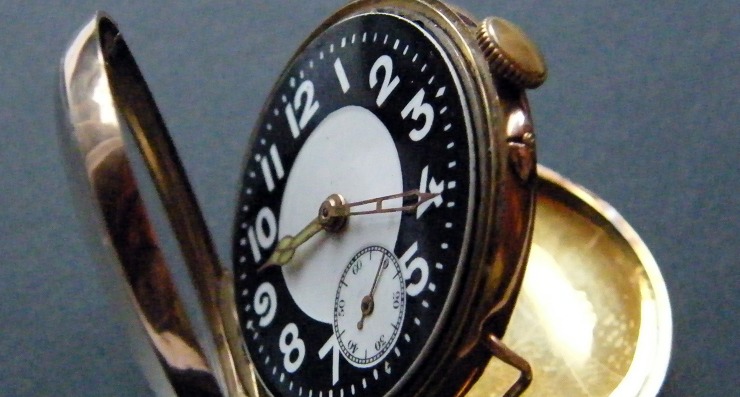 Lapham's Quarterly Fall 2014 has an excellent article on how the telling of time was a matter of survival and strategy during World War I. "Because much of the infantry went underground, it was no longer possible simply to holler or sound a hunting horn as a signal to attack, nor for regiments to advance proudly, and visibly, together on horseback. Instead, it became necessary to coordinate time and to tell it accurately; the practice and the phrase synchronize watches was born from this need during the war. Officers in crowded trenches watched for second hands to tick down before blowing the whistle and rallying their men, who scrambled up ladders into the awaiting gunfire. The term zero hour, the moment of no return, was first recorded in the New York Times in November 1915: 'At 5:05 a.m. September 25 a message came to the dugout that the "zero" hour, that is, the time the gas was to be started, would be at 5:50 a.m.' The irony of ascribing a precise time for an attack as uncontrollable and weather-dependent as gas goes unmentioned."
Lapham's Quarterly Fall 2014 has an excellent article on how the telling of time was a matter of survival and strategy during World War I. "Because much of the infantry went underground, it was no longer possible simply to holler or sound a hunting horn as a signal to attack, nor for regiments to advance proudly, and visibly, together on horseback. Instead, it became necessary to coordinate time and to tell it accurately; the practice and the phrase synchronize watches was born from this need during the war. Officers in crowded trenches watched for second hands to tick down before blowing the whistle and rallying their men, who scrambled up ladders into the awaiting gunfire. The term zero hour, the moment of no return, was first recorded in the New York Times in November 1915: 'At 5:05 a.m. September 25 a message came to the dugout that the "zero" hour, that is, the time the gas was to be started, would be at 5:50 a.m.' The irony of ascribing a precise time for an attack as uncontrollable and weather-dependent as gas goes unmentioned."Wednesday, October 15, 2014
Zero Hour: The Importance of Time-Keeping in World War I
 Lapham's Quarterly Fall 2014 has an excellent article on how the telling of time was a matter of survival and strategy during World War I. "Because much of the infantry went underground, it was no longer possible simply to holler or sound a hunting horn as a signal to attack, nor for regiments to advance proudly, and visibly, together on horseback. Instead, it became necessary to coordinate time and to tell it accurately; the practice and the phrase synchronize watches was born from this need during the war. Officers in crowded trenches watched for second hands to tick down before blowing the whistle and rallying their men, who scrambled up ladders into the awaiting gunfire. The term zero hour, the moment of no return, was first recorded in the New York Times in November 1915: 'At 5:05 a.m. September 25 a message came to the dugout that the "zero" hour, that is, the time the gas was to be started, would be at 5:50 a.m.' The irony of ascribing a precise time for an attack as uncontrollable and weather-dependent as gas goes unmentioned."
Lapham's Quarterly Fall 2014 has an excellent article on how the telling of time was a matter of survival and strategy during World War I. "Because much of the infantry went underground, it was no longer possible simply to holler or sound a hunting horn as a signal to attack, nor for regiments to advance proudly, and visibly, together on horseback. Instead, it became necessary to coordinate time and to tell it accurately; the practice and the phrase synchronize watches was born from this need during the war. Officers in crowded trenches watched for second hands to tick down before blowing the whistle and rallying their men, who scrambled up ladders into the awaiting gunfire. The term zero hour, the moment of no return, was first recorded in the New York Times in November 1915: 'At 5:05 a.m. September 25 a message came to the dugout that the "zero" hour, that is, the time the gas was to be started, would be at 5:50 a.m.' The irony of ascribing a precise time for an attack as uncontrollable and weather-dependent as gas goes unmentioned."
Subscribe to:
Comments (Atom)